What’s happening at the moment? Who is talking Gender Budgeting? Where and When?
EIGE Gender Budgeting Report 2019: Mainstreaming gender into the EU budget and macroeconomic policy framework
On april 10th 2019 the European Institute for Gender Equality (EIGE) published a report on “Gender Budgeting. Mainstreaming gender into the EU budget and macroeconomic policy framework”. It presents the main research results of the gender budgeting projects of the European Institute for Gender Equality (EIGE) in 2016, 2017 and 2018. … More
Montenegro goes Gender Budgeting
In September 2018 representatives of the Montenegrin Parliament, the Ministry of Human and Minority Rights and the Ministry of Finance, participated in a three-day study visit on Gender Responsive Budgeting and Legislation to Austria, where they met with representatives of the Austrian Parliament, the Italian OSCE Chairmanship, Ministry of Finance, the City of Vienna, and the Federal Chancellery … More
Budgeting for Women’s Rights: Where is the commitment? Gender and development in the next EU Multiannual Financial Framework (MFF)
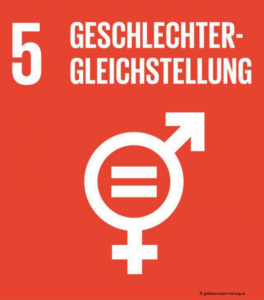 On 19 September 2018 civil society organisations Global Responsibility, Care and Wide are to host a discussion on “Budgeting for Women’s Rights Where is the commitment? Gender and development in the next EU Multiannual Financial Framework (MFF)” in Vienna’s Otto-Mauer-Zentrum.
On 19 September 2018 civil society organisations Global Responsibility, Care and Wide are to host a discussion on “Budgeting for Women’s Rights Where is the commitment? Gender and development in the next EU Multiannual Financial Framework (MFF)” in Vienna’s Otto-Mauer-Zentrum.
The event will revolve around gender adequate EU funding for the promotion of women’s and girls’ rights, their empowerment and gender equality, and the reality in EU development politics. … More
 Kazakhstan goes Gender Budgeting
Kazakhstan goes Gender Budgeting
From 19-23 June 2018, the National Commission on Women Affairs and Socio Demographic Policy of Kasachstan organised a study visit to Vienna featuring Gender Budgeting in which mostly members of the Ministry of Finance and the Ministry of Economy of Kasachstan participated. By visiting the Division Women and Equality, the delegation from Kasachstan had the opportunity to … More
![]() “Gender Equality and Taxation in the European Union”
“Gender Equality and Taxation in the European Union”
On 30th of May the study “Gender equality and taxation in the European Union” was presented to the Committee on Women’s Rights and Gender Equality (FEMM) in the European Parliament which provides an overview over gender aspects in taxation at Member State and EU level and deals with the gender-specific effects of taxation systems. Learn more about it in our blog section.
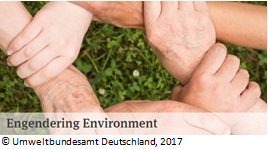
“Engendering Environment. Gender Mainstreaming und Gender Impact Assessment in Environmental and Health Protection”
Date/Place: October 16th, 2017 – 9.00 to 17.15, Federal Press Agency, Berlin
Gender mainstreaming and its instruments, including gender impact assessment, can look back upon over 20 years of history. The conference is devoted to encouraging international exchange of experiences with gender mainstreaming implementation in research as well as in the practice of public administration. For more information read our blog section
 AUSTRIA: 4th outcome-oriented impact assessment released
AUSTRIA: 4th outcome-oriented impact assessment released
On 31 May 2017 the fourth report on the results-oriented impact assessment was presented to the National Council of Austria. The report summarised the results of the ministerial evaluations as well as those undertaken by other high authorities of the Republic of Austria. It has been compiled by the Austrian Federal Performance Management Office, which is part of the Federal Chancellery. Learn more about it in our blog section.
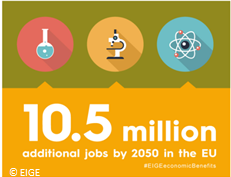 EIGE Study on the Economic Benefits of Gender Equality in the European Union
EIGE Study on the Economic Benefits of Gender Equality in the European Union
On the occasion of the International Women’s Day, the European Institute for Gender Equality released a study on the economic benefits of gender equality in the EU. The study is an unparalleled attempt to use a robust econometric model to estimate socio-economic outcomes of improving gender equality in several broad areas including education, labour market participation, wages and work-life balance. The results speak for themselves: Gender equality would boost economic growth and proves to be a vital instrument in tackling tomorrow’s (demographic) challenges. Read more about the study and access the link in our blog area.
![]() BELARUS goes Gender Budgeting
BELARUS goes Gender Budgeting
From 24-25 November, the OSCE Mission in Warsaw organised a study visit to Vienna featuring Gender Budgeting. The aim was to learn about best practices from Austria which has taken a pioneering role when it comes to promoting equity in budgets. Belarus has also made attempts at furthering Gender Budgeting. By way of example, it created an interdisciplinary task group, which is similar to the Austrian Inter-Ministerial Working Group Gender Mainstreaming/Gender Budgeting (GMB). By … More
 Scrutinising the Austrian Draft Budget for 2017
Scrutinising the Austrian Draft Budget for 2017
The Austrian Parliamentary Budget Committee (see website of the Parliament) compiles analyses and reports for the parliamentary budget committee. In preparation of the parliamentary budget negotiations on the Annual Federal Finance Act for 2017, the Parliamentary Budget Office scrutinised the draft budgetary plans for 2017. One chapter is dedicated to gender equality and gender budgeting. The full version is available here. You might also take a look at our blog section, where a summary of the report has been provided.
 AUSTRIA: Report on RIA has been released
AUSTRIA: Report on RIA has been released
The Austrian Federal Performance Management Office released its annual report on Regulatory Impact Assessments (RIA). This report must be compiled annually in accordance with art 68 para 5 Federal Budget Act and art 7 para 5 of the Austrian regulation on outcome orientation in budgeting. It complements the Report on the results-oriented impact assessment, which must be submitted to the National Council until 31 May every year. The RIA report deals with whether and to which degree objectives on outcome orientation have been reached during the last financial year or not and must be submitted until 31 October. For more information, see the website of the Austrian civil service or http://www.wirkungsmonitoring.gv.at.
 LONDON: Professional Certificate in Strategic Gender Equity Planning
LONDON: Professional Certificate in Strategic Gender Equity Planning
From 13 to 17 February 2016 a five-day seminar on Gender Equality will be held in London, at the end of which a certificate will be awarded to successful candidates. The seminar aims at
- Analysing the role gender holds in development planning
- Understanding how to integrate gender equity into strategic planning processes
- Considering legislative initiatives to improve gender equality and reduce discrimination
- Evaluating the consequences of gender initiatives
The programme is available at the following link: http://genderequity.parlicentre.org/programme.php
 BERLIN: Is Gender Budgeting Economically Viable?
BERLIN: Is Gender Budgeting Economically Viable?
Economic assessments must be carried out in a long-sighted, correct and efficient way. But: Economic viability, sustainability and equality: Do they really get along with each other? From 7-8 November 2016 Berlin hosted a Seminar featuring economic assessments in the civil service. The seminar provided an insight into the room of manoeuvre, risks and growth potentials. In particular, the following questions were addressed:
- How do you make economic assessments in public institutions correctly?
- What are practical duties, risks and challenges like?
- Which models and calculations methods can be used by project manageres and procurement authorities? What are their inherent advantages and disadvantages?
- How do you evaluate economic assessments in the course of internal and external revisions?
- How do you organise your organisation and your procurement department in order to guarantee maximum economic efficiency?
 MUNICH: Gender Budgeting at the heart of the second Women’s Conference in Munich
MUNICH: Gender Budgeting at the heart of the second Women’s Conference in Munich
From 6 to 7 October 2016 the city of Munich organised the 2nd Women’s Conference in cooperation with the German Association of cities (Deutscher Städtetag) and the German Institute of Urban Affairs. The conference was dedicated to Gender Budgeting.…. More
Besides real-life examples of how to implement Gender Budgeting, other gender equality issues featuring the distribution of resources, power, unpaid and paid work were presented and discussed at the conference. In particular, the following questions were adressed
- What is the point for women, men, girls and boys being informed about the distribution of public ressources and expenditures? What effect do transparent information and visibility have?
- Which are the obstacles and which are the opportunities provided by the different methods?
- What have we learned about further implementation? What remains to be done?
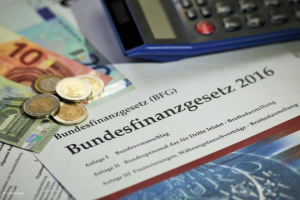 AUSTRIA: 3rd outcome-oriented impact assessment released
AUSTRIA: 3rd outcome-oriented impact assessment released
On 31 May 2016 the third report on the results-oriented impact assessment was presented to the National Council of Austria. The report summarised the results of the ministerial evaluations as well as those undertaken by other high authorities of the Republic of Austria. It has been compiled by the Austrian Federal Performance Management Office, which is part of the Federal Chancellery. Learn more about it in our blog section.
 LONDON: Professional Certificate in Strategic Gender Equity Planning
LONDON: Professional Certificate in Strategic Gender Equity Planning
From 12 to 16 September 2016 a five-day seminar on Gender Equality was held in London, at the end of which a certificate was awarded to successful candidates. The seminar aimed at
- Analysing the role gender holds in development planning
- Understanding how to integrate gender equity into strategic planning processes
- Considering legislative initiatives to improve gender equality and reduce discrimination
- Evaluating the consequences of gender initiatives
The programme is available at the following link: http://genderequity.parlicentre.org/programme.php
 ANDALUSIA: IV Conference on Economy and Gender Budgeting
ANDALUSIA: IV Conference on Economy and Gender Budgeting
For more than 10 years, the Andalusian Administration has been implementing Gender Responsive Budgeting for more than a decade, in order to contribute to a more equitable distribution of budgetary resources and the correction of inequalities between women and men, thereby increasing the efficiency and effectiveness in the use of public resources. On 6 July 2016 the “IV Conference on Economy and Gender Budgeting” was held in Sevilla. Representatives of the municipalities, the OECD and the European Parliament gave presentation at this conference.
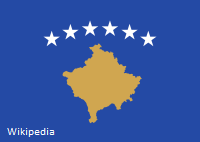 KOSOVO goes Gender Budgeting
KOSOVO goes Gender Budgeting
From 23-26 May, the OSCE Mission in Kosovo organised a study visit to Vienna featuring Gender Budgeting. The aim was to learn more about best practices in other countries in order to apply lessons learned in their country where Gender Budgeting obligations have been enshrined in … More
 EIPA Workshop on Gender Budgeting
EIPA Workshop on Gender Budgeting
From 18-19 May 2016 EIPA organised a workshop on Gender Budgeting. The aim was to better understand
- the role of budgeting in public financial management;
- the current context and challenges for budgeting for finance staff and budget users at organisational, departmental and activity/project level;
- approaches to budgeting at EU level and at national and sub-national level used in different EU Member States;
- how budgets are prepared and used in practice;
- how to conduct public sector budget reviews and service reviews in parallel, using techniques such as performance budgeting.
For more information, see: http://seminars.eipa.eu/en/activities09/show/&tid=5893.
